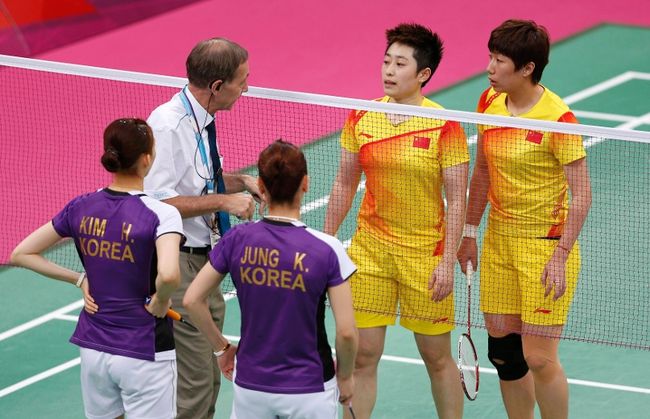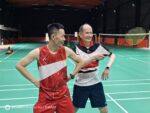If there is one thing I love as much as badminton, it’s writing. And like most natural born writers, reading comes in at a close second.
As someone who is not a jock, I’ve kinda taken a more analytical approach to badminton than some others might. I not only notice my changes and my feelings, but I continually ask myself “why?” Why do I feel this way? Why is this changing this way? What is really going on when I feel a certain emotion etc? I’m definitely approaching the sport with an analytical/philosophical eye than just a “jocks rule! I’ma be the best!” way.
So to that end I’m reading a lot of books about sports, sports psychology and others. Partially it’s to help me avoid things like choking, to which I’m prone, but also because I want to understand things more.
So why not share what I’m reading? After I finish a book I’ll do a quick little introduction and offer up some of the best wisdom from the book. So grab a cup of tea and let’s start, shall we?
This weeks book is Knowing the Score, by David Papineau

I stumbled upon this book in the sports section of my local Barnes & Nobles when I went back to America for a visit last month. A book that combines not psychology but philosophy and sports. Hello?! Could there be anything better?!
Like the author says in the beginning, there isn’t many people where these two interest overlap. I mean, look at the badminton blogging world. Blogs saturate the market in every category, yet there are very few personal badminton blogs because jocks and writers don’t seem to go hand-in-hand the same way as, say, travelers and writers do.
Philosophers and jocks even less so I’d imagine. But it’s exactly where my interest connect I thought it worth lugging back the hard cover book back to China. And I’m glad I did!
The book is broken into a few sections labeled: Focus, Rules, Teams and so on and each sections has several chapters that are more like little lectures. You don’t need to read the earlier ones to understand the later ones.
Throughout the book the author uses many different sports examples to illustrates his point and once he even uses badminton! He talks about the 2012 Olympics when it was more advantageous for the teams to lose their final group match which would give them a better chance in the next knock-out round. As the crowd booed and the umpire warned them, the teams played half-heartedly, repeatedly missing the birdie or hitting it into the net and were ultimately disqualified for poor sportsmanship. (Here is a small news clip (link) about it.)

From a sports point-of-view these players showed poor judgement and were ultimately disqualified. But what does a philosopher think?
While they were shamed by just about everyone for poor sportsmanship, the philosopher takes a different view. “I thought it it was outrageous that the players should have their Olympic hopes shattered, just for doing their best to win the tournament,” he writes. “What did the organizers expect, if they hadn’t the sense to organize a competition properly? The hazards of group-knockout competitions are well known. If anyone betrayed the Olympic spirit, it was the incompetent badminton authorities, not the players.”
That’s the different kind of thinking you get when you have a philosopher analyzing sports rather than a just a sports fan.
He also poses other interesting questions such as “Is the same team even if all the people change over time?” and “why do some opponents actually cooperate in the middle of a major competition?” He brought up a lot of questions I had never thought of before but seem obvious in retrospect like “why haven’t any new major sports been invented recently?”
Personally I like my philosophy old school Socrates style. I like open ended questions in which you come up with your own answers but Papineau doesn’t do that. He asks a question and then tells you his opinion. But he is also very obvious about it and doesn’t write like his opinion is the truth. “In my opinion,” or “I think,” is thrown before every statement so you can form your own opinion as well.
My favorite chapter was actually the last chapter called: Shankley, Chomsky, and the Nature of Sports.
He starts off with a quote from soccer coach Bill Shankley.
“Football isn’t a matter of life and death. It’s much more important than that.”
Then he follows it up with Noam Chomsky who thought sports was just a capitalistic trick.
“(Sports is) an area which has no meaning, as a displacement from the serious problems which one cannot influence.”
Now, as harsh as that sounds, I kinda get where he is coming from. I’ve always admired athletes and their physical prowess, but I never saw sports as something important of meaningful. Not compared to literature or science.
And Papineau understands both sides too. He gets that for most athletes what they do on the field doesn’t affect their lives. It doesn’t change their jobs, or pay their salary. It doesn’t cure cancer or prevent forest fires or helps to run the trains on time. It’s very similar to my musing when I was wondering (link) why I play badminton.
But we both come to the same conclusion. Who cares if it doesn’t make the trains run on time? Who cares if none of your co-workers know what you do nights and weekends?
“We are too quick to conclude, just because sports don’t matter to other things, that they don’t matter at all. But this doesn’t follow. Success on the sports field might not advance your career or influence the course of world history. But this doesn’t mean that it is not important and valuable in its own right. Even if sporting achievements are cut off from the rest of life, they are still worth striving for.
I would also argue that sports has a lot of psychological affects that do end up bleeding into your “real life” and improve your job performance and your personal relationships, but even if that wasn’t the case, he’s right. To me the striving is the payoff. The challenge of improving yourself is where the meaning comes from. And we are allowed to do things in this world that make us happy, satisfied and feel good for no other reason then they make us happy, satisfied and feel good.
So if you are a weirdo like me, and like a little philosophy with your sports I definitely recommend this book. You can read it all in a few days or just peruse it slowly, reading random chapters when you have time. It’s definitely worth it.
Have you read the book? Let me know what you think in the comments!








You have to get the book “The Inner Game of Tennis: The Classic Guide to the Mental Side of Peak Performance” by W. Timothy Gallwey. It is one of the best books on the mental aspects of a game.
Though it is written with Tennis in mind it is very easy to apply the lessons to any sport.
I have it! I just got it a few days ago but it will be the next book I review for sure. It’s great! I even found a chinese copy that I’m going to give my coach and club because I think they will all benefit from it. Stay tuned. 😉
Hi Becky, was really interested in reading your Badminton Adventure in Xiamen. I am planning a trip with my staff to Xiamen. We are planning a trip to Xiamen and looking for a place to train and compete in a Friendly Match.
I will appreciate if you could point me in the right direction who can help us in the matter.
Your help will be valued.
Check your e-mail! 😉